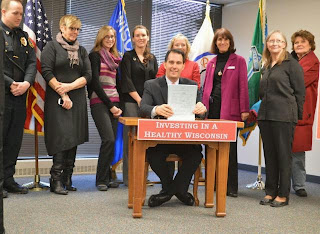March 21, 2014
Although this Wisconsin winter has been characteristically frigid, the mental health community has felt unusual warmth. Last month, we stood beside Governor Scott Walker as he signed seven important mental health bills into law.
The legislation included some of NAMI Wisconsin’s long-standing priorities including funding to address limited access to psychiatry and crisis services in rural Wisconsin, funding for Crisis Intervention Team training to improve law enforcement officers’ understanding of mental illness and, last but certainly not least, funding to improve and expand Individual Placement and Support (IPS) supported employment in Wisconsin. In partnership with other advocates, NAMI Wisconsin presented a proposal to expand funding for IPS to Representative Joe Sanfelippo, who soon introduced it as a bill that gained strong bipartisan support. As a result, many more Wisconsinites living with mental illness will be able to find and maintain competitive employment.
NAMI Wisconsin’s grassroots advocates worked throughout the legislative session to educate our policymakers about our issues. During legislative hearings, NAMI members spoke passionately about their personal experiences and suggested ways to improve our state’s mental health system. Their voices were heard. Much of the recently signed legislation reflected our calls to improve access to recovery-oriented services and increase diversion from the criminal justice system.
Before signing the bills at the county human services department, Governor Walker visited NAMI Brown County, a local affiliate in Green Bay, to tour their resource center, learn about NAMI programs and chat with us about mental health. We discussed the need to devote more attention and resources toward fighting the stigma of mental illness, particularly when stigma becomes outright discrimination.
Governor Walker mentioned that when people live with other chronic illnesses—using his wife, Tonette, who lives with diabetes as an example—they receive support and comfort, not shame or embarrassment. Our response should be no different when someone experiences mental illness.
The Governor also emphasized that although this legislation is a significant step in a very promising direction, it should not be a “one-time photo-op,” but rather a continual investment in mental health services and stigma reduction. We were encouraged to hear an interest in maintaining the current momentum. In the past year, Governor Walker and the Legislature have made significant investments in mental health.
The Governor’s 2013-2015 budgets included state funding to expand community-based care statewide. In our county-based system, the state has never provided this type of support. The budget also included funding to open several peer-run respite centers, an exciting service that our state has never seen.
Although these are excellent investments, there is still plenty of work to be done. We still hear from people around the state who face discrimination in employment, school and health care settings as a result of their mental illness. Our jails and prisons still house thousands of people living with mental illness that need care and compassion, not incarceration. Wisconsin is still one of the states that turned down federal dollars to expand Medicaid, a decision that hurts thousands of Wisconsinites affected by mental illness.
Nonetheless, the last year has seen a promising movement toward community-based, recovery-oriented care and we will work hard to keep Wisconsin moving in this direction.
We’re always accepting submissions to the NAMI Blog! We feature the latest research, stories of recovery, ways to end stigma and strategies for living well with mental illness. Most importantly: We feature your voices.
LEARN MORENAMI HelpLine is available M-F, 10 a.m. – 10 p.m. ET. Call 800-950-6264,
text “helpline” to 62640, or chat online. In a crisis, call or text 988 (24/7).